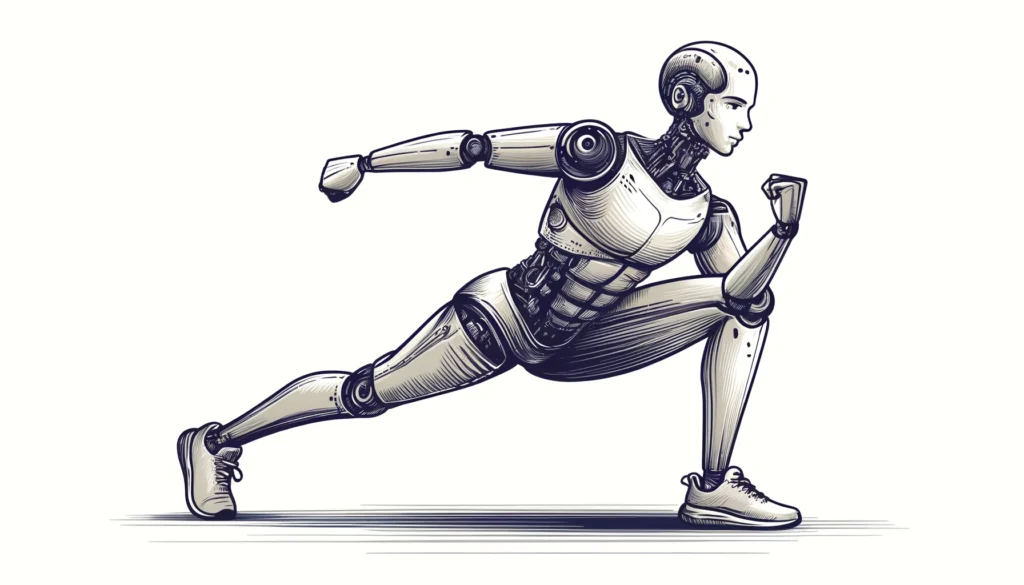As we navigate a world brimming with data and technology, artificial intelligence (AI) emerges as a beacon of progress in healthcare.
Our journey through the digital age has led us to deploy AI as a vital tool to revolutionize medical care, research, and patient outcomes.
The integration of AI into health systems is not just a leap into modernity but a stride towards more personalized and efficient healthcare services.
AI’s inception in health sectors around the globe is more than just a trend; it’s becoming a necessity in overcoming barriers in service delivery.
From managing medical records with unparalleled precision to aiding in complex surgeries, AI’s role is transcending traditional expectations.
The partnership between healthcare professionals and AI is crafting a future where diagnosis is swifter, treatments are tailored, and preventive medicine is more profound.
We’re witnessing an era where AI doesn’t just complement healthcare; it is beginning to redefine it.
High-accuracy diagnostics, predictive analytics, and robotic-assisted surgeries are just the tip of the AI iceberg.
By harnessing the power of AI, we’re not just innovating; we’re paving the way for a healthier tomorrow.
The Fundamentals of AI in Healthcare
Harnessing the power of artificial intelligence (AI), we’re transforming medicine; elevating healthcare to unprecedented levels of precision and efficiency.
AI Technologies and Modalities
Dive into the world of AI technologies and you’ll find a treasure trove of modalities revolutionizing healthcare.
At the heart of this revolution are algorithms. These algorithms are not just lines of code; they’re our digital detectives, uncovering clues hidden in mountains of data.
We deploy a variety of technologies in healthcare, from natural language processing that interprets human speech to computer vision that recognizes patterns in medical imagery.
With these efficient tools, we aim for the gold standard of accuracy in every analysis.
Screening and Diagnosis
Now, let’s talk about the dynamic duo of screening and diagnosis.
When it comes to detecting diseases, we’re like a highly skilled artist with a keen eye for the tiniest details.
We’ve made it our mission to spot health conditions early when they’re most treatable.
Whether it’s a whisper-thin fracture or a subtle change in tissue density, our AI-powered systems don’t miss a beat.
Breakthroughs in AI have led to faster, more reliable assessments, supporting healthcare professionals to diagnose with confidence.
Roles of Machine Learning and Deep Learning
Enter the fascinating world of machine learning and deep learning, where our AI systems learn like humans—only faster and sometimes smarter.
We feed our machines a balanced diet of big data, and in return, they learn to recognize complex patterns and make predictions.
With machine learning, think of us as diligent gardeners tending to our data, nurturing it to produce the best outcomes.
And when it comes to deep learning, we’re plumbing the depths of data’s ocean, unveiling insights with astonishing precision.
We leverage these forms of AI across a broad spectrum of applications in healthcare, casting a spotlight on their potential to revolutionize medicine as we know it.
AI Implementation and Clinical Workflows
In this rapidly evolving era, we’re witnessing a remarkable fusion of AI with our daily clinical operations, ensuring an enhanced healthcare landscape.
Automated Systems in Practice
AI’s sophistication ushers in an era where routine administrative tasks are adeptly managed by our non-fatigable digital counterparts.
Imagine systems that transcribe consultations with the finesse of our most diligent secretary.
We see patient experiences soaring as these automated systems streamline scheduling and handle medical coding with unprecedented accuracy.
It’s not science fiction; it’s AI in healthcare today.
Impact on Healthcare Workers
Let’s not forget the heart and soul of our medical institutions—our healthcare workers.
As AI systems take charge of the tiresome paperwork, our clinicians get back to what they do best: caring for patients, not keyboards.
It’s a win-win: less burnout for them, better care for patients.
We’re nurturing an environment where clinical workflow enhancement is not a buzzword but a reality that breathes life back into overworked healthcare professionals.
Revolutionizing Health Data Analysis
Hold onto your stethoscopes, because health data analysis is getting a turbo boost.
Poring through volumes of data manually is a thing of the past.
With AI now in the driver’s seat, we’re identifying patterns and predicting outcomes faster than ever before.
We’re not just talking about rough estimates but precise, actionable insights that pave the way for personalized medicine.
It’s like having the sharpest detective comb through the clues in your health records—only, with AI, it’s measurable, scalable, and impressively swift.
Patient-Centric AI Development
In crafting Artificial Intelligence applications within healthcare, our focus steadfastly remains on patient-centered innovations.
Improving Patient Safety and Outcomes
With artificial intelligence seamlessly integrated into healthcare, we’re on the front lines ensuring patient safety is paramount.
From flagging potential medication interactions to predicting patient deterioration, AI acts as a vigilant guardian.
For example, AI algorithms quickly analyze large volumes of patient data, giving healthcare providers actionable insights that lead to timely interventions.
-
AI Diagnostic Assistance:
-
- Detect anomalies in medical imaging.
- Reduce diagnostic errors through pattern recognition.
-
-
Predictive Analytics in Patient Monitoring:
- Forecast patient trajectories.
- Enable preemptive care measures.
By incorporating these technologies, we have the potential to lower the rates of medical errors and bolster overall health outcomes.
Personalized Medicine and Patient Experience
Crafting a precision medicine model through AI not only tailors treatment to each patient’s genetic makeup but also elevates the entire patient experience.
Pioneering AI applications sift through a patient’s medical history, lifestyle factors, and genetic information to devise treatment plans with unparalleled specificity.
- Patient-Tailored Therapies:
- Leverage genetic information for targeted medication.
- Fine-tune treatment efficacy with data-driven adjustments.
The allure of such hyper-tailored care doesn’t just lie in improved health outcomes—it’s also about the feeling of being truly “seen” by the health system.
Patients are more than statistics; they’re individuals with unique stories, and AI lets us treat them as such.
AI and Public Health
In the realm of public health, artificial intelligence (AI) stands as a transformative force, enhancing disease control and population health management through data-driven insights and genomics.
AI for Epidemics and Disease Control
We’re at the forefront of a revolution, where AI swiftly maps the spread of infections, potentially saving lives with rapid responses.
Picture AI models that not only predict outbreaks but also strategize containment—a high-tech game of chess with microbes as the adversary.
By analyzing vast datasets, AI systems like those developed by the Global Initiative on AI for Health enhance surveillance and pinpoint hotspots with pinpoint precision.
We’re not superheroes; we just have a supercomputer ally in our quest to curb diseases.
Population Health and Genomics
What happens when AI meets genomics? We unlock personalized healthcare on a massive scale.
Let’s not just brush over population health analytics; AI is turning this into a box of treasures, revealing patterns in genetics that were once cryptic puzzles.
The interplay between AI and genomics opens up avenues for understanding complex diseases tailored to individual genetic makeup, as highlighted in insightful discussions on platforms like McKinsey.
Promise looms on the horizon—prevention and intervention strategies that are so spot-on, they almost seem to predict the future.
Ethics, Governance, and Regulation
In our quest to harness artificial intelligence for health-related applications, we must meticulously navigate the intertwined pathways of ethics, governance, and regulation.
Privacy and Confidentiality Issues
Privacy is not a mere afterthought; it’s the bedrock of trust in healthcare AI.
We ensure that patient data is handled with the utmost respect and confidentiality.
From encryption to anonymization, a buffet of strategies is at our disposal to safeguard personal health information.
But we won’t sugarcoat it – the temptation for data misuse is like cookies in the cookie jar. That’s why we maintain strict access controls and transparency to build trust.
Regulatory Challenges and Standards
Navigating the regulatory labyrinth is akin to dancing tango with red tape while maintaining the grace of a swan.
The standards set are high, and rightfully so, as they ensure accountability and quality in AI health solutions.
We’re committed to not just meeting but exceeding these standards. At the same time, we advocate for regulations that foster innovation, not stifle it.
Our choreography must be precise, for one misstep could mean compromising our integrity or derailing progress.
Technological Innovation and Investment
We’re witnessing a pivotal moment where investment and innovation in AI technologies are sculpting the future of healthcare.
This surge propels healthcare organizations, pharmaceutical companies, and even governments to pool their resources in pursuit of smarter healthcare solutions.
Advancements in AI Technologies
Recent breakthroughs in AI systems have laid the groundwork for remarkable improvements in diagnosis, treatment plans, and patient monitoring.
We’ve seen algorithms that can predict patient outcomes more accurately than ever before, and they’re learning at an astonishing pace.
Let’s not forget the AI-powered robots; they are not here to take over the world, but they are transforming surgical precision.
Funding and Resource Allocation
When it comes to funding, healthcare organizations have significantly increased their wallets, earmarking substantial resources for AI development.
It’s not just private capital leading the charge—governments worldwide are stepping up, recognizing the potential of AI to reduce costs and streamline healthcare services.
Healthcare is not just about bandages and stethoscopes anymore; it’s about bits and bytes as much as it is about scalpels and sutures.
Challenges and Opportunities in AI for Health
Navigating the transformative landscape of artificial intelligence in health care, we encounter diverse challenges and opportunities.
It’s a thrilling expedition where the peaks symbolize profound potential benefits and the valleys, the intricate difficulties we must surmount.
Health Equity and Environmental Factors
As we spearhead the integration of AI into health care, health equity emerges as a paramount concern.
We must ensure that these advanced technologies are accessible across various socioeconomic strata and do not exacerbate existing disparities in health care.
On one hand, AI holds the promise of tailored health solutions that consider environmental factors, potentially leveling the playing field for underprivileged communities.
Yet, we must rigorously address the risk of inadvertently coding biases into AI systems that could detract from the goal of equity.
Managing Risks and Setting Realistic Expectations
Let’s talk turkey—AI isn’t a magic wand.
Managing the risks associated with AI, such as privacy concerns and the potential for misdiagnosis, is a challenge we must tackle head-on.
Moreover, setting realistic expectations is key. While AI can enhance the efficiency and accuracy of health services, it’s not infallible.
By acknowledging AI’s limitations and developing robust safety nets, we champion its strengths and shield against its weaknesses, affording the health care sector the best of AI without the sting of unforeseen pitfalls.
Future Trends in AI and Medicine
The horizon of medicine is rapidly expanding with AI as the driving force, beckoning a future where health care is more predictive, personalized, and accessible.
Predictive Analytics in Healthcare
Imagine a world where we could know the likelihood of a disease before it knocks on our door.
That’s the promise of predictive analytics in healthcare.
By sifting through mountains of data, AI is on the verge of anticipating health issues, possibly even before symptoms surface.
Researchers are harnessing AI to analyze patterns that human experts might overlook, heralding a new era of preemptive medicine.
For instance, algorithms could alert us to the risk of chronic diseases by evaluating factors such as genetics, lifestyle, and environmental data, streamlining the path to early intervention that can save lives.
By staying on top of health trends, we’re not just reacting to illnesses but are steps ahead, armed and ready.
Expanding Accessibility Through Mobile and Cloud Technologies
Who would have thought our smartphones could become our personal health guardians?
Mobile and cloud technologies are breaking down geographical barriers, bringing expert-level care to the tips of our fingers.
With the power of AI, medical applications on mobile devices can offer preliminary diagnoses and monitor health metrics from afar, extending the reach of healthcare professionals.
Cloud computing isn’t just for storing photos and music anymore; it’s a potent vessel for AI-driven healthcare research.
Through the cloud, immense databases of medical information are accessible to AI anywhere, at any time, ensuring that the latest insights are always at the forefront of patient care.
We’re not just connecting calls, we’re connecting care!
AI’s integration into mobile and cloud technologies ensures that quality healthcare isn’t just a privilege for the few but a standard for all, no matter the location.
Rest assured, we’re just scratching the surface of what these technologies have in store for us.
What are some specific examples of AI applications in patient care?
Harnessing AI to Revolutionize Patient Care
Artificial Intelligence (AI) is enhancing patient care in various ways. Here are some specific examples:
- Precision in Patient Positioning and CT Image Reconstruction: AI-enabled camera technology automatically detects anatomical landmarks, ensuring accurate and consistent patient positioning for CT scans. AI also improves image reconstruction, enhancing quality and supporting diagnostic confidence.
- Accelerating Image Acquisition in MR: AI-based image reconstruction speeds up MR exams, boosting department productivity and reducing costs per exam. This technology also improves the patient experience by shortening the time spent in the scanner.
- Automating Ultrasound Measurements in Cardiac Care: AI automates repetitive tasks in ultrasound imaging, such as essential measurements for every echo exam, reducing time consumption and variability.
- Enhancing Surgical Precision with Robotic Equipment: AI-equipped robotic systems assist surgeons by minimizing physical fluctuations and providing real-time information during operations, enhancing precision and outcomes.
- Predictive Maintenance of Medical Equipment: AI predicts when medical equipment needs maintenance, ensuring optimal functionality and reducing downtime.
These applications demonstrate how AI improves healthcare operations’ efficiency and enhances patient care quality. As AI technology continues to advance, even more innovative applications will likely emerge in patient care.
Navigating the Peaks and Valleys
Pros and Cons of AI in Healthcare
The integration of Artificial Intelligence (AI) in healthcare presents both advantages and challenges. Here’s a breakdown of the key points:
The integration of Artificial Intelligence (AI) in healthcare presents both advantages and challenges. Here’s a breakdown of the key points:
Pros:
- Real-Time Data: AI furnishes immediate and precise data crucial for diagnosing and addressing medical issues.
- Streamlined Tasks: AI streamlines tasks like appointment scheduling, patient tracking, and insurance claim reviews, saving time and resources.
- Early Detection and Diagnosis: AI algorithms analyze medical data, including X-rays and MRIs, with high precision, aiding in early disease detection.
- Personalized Treatment Plans: AI analyzes patient histories and genetic data to develop tailored treatment plans, leading to more effective treatments with fewer side effects.
- Telemedicine and Remote Monitoring: AI enhances telemedicine and remote patient monitoring, improving access to care and managing chronic conditions effectively.
Cons:
- Data Privacy and Security: Concerns arise regarding the privacy and security of patient data when AI is used in healthcare.
- Dependence on Technology: Over-reliance on AI may decrease human oversight and undervalue professional medical judgment.
- Cost of Implementation: The initial cost of implementing AI technologies can be prohibitive for some healthcare providers.
- Ethical Considerations: Ensuring AI’s decision-making aligns with ethical standards poses challenges.
- Risk of Errors: While AI can reduce human error, incorrect or biased data can lead to inaccurate conclusions.
These points reflect the ongoing discussion about AI’s role in healthcare, underlining the importance of carefully considering its implementation and impact.












